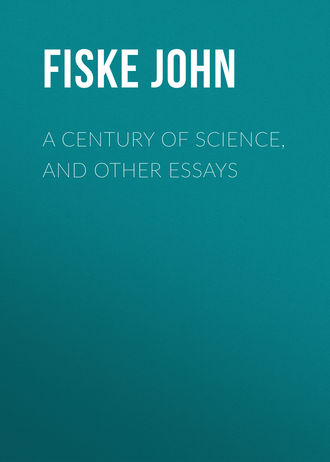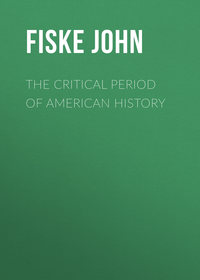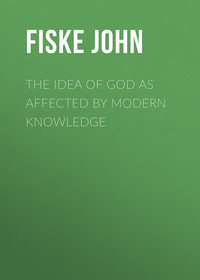 полная версия
полная версияA Century of Science, and Other Essays
As a crown to all this useful work, Youmans established, in 1872, "The Popular Science Monthly," which has unquestionably been of high educational value to the general public. It was not the aim of this magazine to give an account of every theory expounded, every fact observed, every discovery made, from year to year, whether significant or insignificant. The mind of the people is not educated by dumping a great unshapely mass of facts into it. It needs to be stimulated rather than crammed. Education in science should lead one to think for one's self. The scientific magazine, therefore, should present articles from all quarters that deal with the essential conceptions of science or discuss problems of real theoretical or practical interest, no matter whether every particular asteroid or the last new species of barnacle receives full attention or not. "The Popular Science Monthly" has now been with us eighteen years; its character has always been of the highest, and it must have exerted an excellent influence not only as a diffuser of valuable knowledge, but in training its readers to scientific habits of thought in so far as mere reading can contribute to such a result.
In concluding our survey of this useful and noble life, what impresses us most, I think, is the broad democratic spirit and the absolute unselfishness which it reveals at every moment and in every act. To Edward Youmans the imperative need for educating the great mass of the people so as to use their mental powers to the best advantage came home as a living, ever present fact. He saw all that it meant and means in the raising of mankind to a higher level of thought and action than that upon which they now live. To this end he consecrated himself with unalloyed devotion; and we who mourn his loss look back upon his noble career with a sense of victory, knowing how the good that such a man does lives after him and can never die.
March, 1890.
IV
THE PART PLAYED BY INFANCY IN THE EVOLUTION OF MAN 16
The remarks which my friend Mr. Clark has made with reference to the reconciling of science and religion seem to carry me back to the days when I first became acquainted with the fact that there were such things afloat in the world as speculations about the origin of man from lower forms of life; and I can recall step by step various stages in which that old question has come to have a different look from what it had thirty years ago. One of the commonest objections we used to hear, from the mouths of persons who could not very well give voice to any other objection, was that anybody, whether he knows much or little about evolution, must have the feeling that there is something degrading about being allied with lower forms of life. That was, I suppose, owing to the survival of the old feeling that a dignified product of creation ought to have been produced in some exceptional way. That which was done in the ordinary way, that which was done through ordinary processes of causation, seemed to be cheapened and to lose its value. It was a remnant of the old state of feeling which took pleasure in miracles, which seemed to think that the object of thought was more dignified if you could connect it with something supernatural; that state of culture in which there was an altogether inadequate appreciation of the amount of grandeur that there might be in the slow creative work that goes on noiselessly by little minute increments, even as the dropping of the water that wears away the stone. The general progress of familiarity with the conception of evolution has done a great deal to change that state of mind. Even persons who have not much acquaintance with science have at length caught something of its lesson, – that the infinitely cumulative action of small causes like those which we know is capable of producing results of the grandest and most thrilling importance, and that the disposition to recur to the cataclysmic and miraculous is only a tendency of the childish mind which we are outgrowing with wider experience.
The whole doctrine of evolution, and in fact the whole advance of modern science from the days of Copernicus down to the present day, have consisted in the substitution of processes which are familiar and the application of those processes, showing how they produce great results.
When Darwin's "Origin of Species" was first published, when it gave us that wonderful explanation of the origin of forms of life from allied forms through the operation of natural selection, it must have been like a mental illumination to every person who comprehended it. But after all it left a great many questions unexplained, as was natural. It accounted for the phenomena of organic development in general with wonderful success, but it must have left a great many minds with the feeling: If man has been produced in this way, if the mere operation of natural selection has produced the human race, wherein is the human race anyway essentially different from lower races? Is not man really dethroned, taken down from that exceptional position in which we have been accustomed to place him, and might it not be possible, in the course of the future, for other beings to come upon the earth as far superior to man as man is superior to the fossilized dragons of Jurassic antiquity?
Such questions used to be asked, and when they were asked, although one might have a very strong feeling that it was not so, at the same time one could not exactly say why. One could not then find any scientific argument for objections to that point of view. But with the further development of the question the whole subject began gradually to wear a different appearance; and I am going to give you a little bit of autobiography, because I think it may be of some interest in this connection. I am going to mention two or three of the successive stages which the whole question took in my own mind as one thing came up after another, and how from time to time it began to dawn upon me that I had up to that point been looking at the problem from not exactly the right point of view.
When Darwin's "Descent of Man" was published in 1871, it was of course a book characterized by all his immense learning, his wonderful fairness of spirit and fertility of suggestion. Still, one could not but feel that it did not solve the question of the origin of man. There was one great contrast between that book and his "Origin of Species." In the earlier treatise he undertook to point out a vera causa of the origin of species, and he did it. In his "Descent of Man" he brought together a great many minor generalizations which facilitated the understanding of man's origin. But he did not come at all near to solving the central problem, nor did he anywhere show clearly why natural selection might not have gone on forever producing one set of beings after another distinguishable chiefly by physical differences. But Darwin's co-discoverer, Alfred Russel Wallace, at an early stage in his researches, struck out a most brilliant and pregnant suggestion. In that one respect Wallace went further than ever Darwin did. It was a point of which, indeed, Darwin admitted the importance. It was a point of which nobody could fail to understand the importance, that in the course of the evolution of a very highly organized animal, if there came a point at which it was of more advantage to that animal to have variations in his intelligence seized upon and improved by natural selection than to have physical changes seized upon, then natural selection would begin working almost exclusively upon that creature's intelligence, and he would develop in intelligence to a great extent, while his physical organism would change but slightly. Now, that of course applied to the case of man, who is changed physically but very slightly from the apes, while he has traversed intellectually such a stupendous chasm.
As soon as this statement was made by Wallace, it seemed to me to open up an entirely new world of speculation. There was this enormous antiquity of man, during the greater part of which he did not know enough to make history. We see man existing here on the earth, no one can say how long, but surely many hundreds of thousands of years, yet only during just the last little fringe of four or five thousand years has he arrived at the point where he makes history. Before that, something was going on, a great many things were going on, while his ancestors were slowly growing up to that point of intelligence where it began to make itself felt in the recording of events. This agrees with Wallace's suggestion of a long period of psychical change, accompanied by slight physical change.
Well, in the spring of 1871, when Darwin's "Descent of Man" came out, just about the same time I happened to be reading Wallace's account of his experiences in the Malay Archipelago, and how at one time he caught a female orang-outang with a new-born baby, and the mother died, and Wallace brought up the baby orang-outang by hand; and this baby orang-outang had a kind of infancy which was a great deal longer than that of a cow or a sheep, but it was nothing compared to human infancy in length. This little orang-outang could not get up and march around, as mammals of less intelligence do, when he was first born, or within three or four days; but after three or four weeks or so he would get up, and begin taking hold of something and pushing it around, just as children push a chair; and he went through a period of staring at his hands, as human babies do, and altogether was a good deal slower in getting to the point where he could take care of himself. And while I was reading of that I thought, Dear me! if there is any one thing in which the human race is signally distinguished from other mammals, it is in the enormous duration of their infancy; but it is a point that I do not recollect ever seeing any naturalist so much as allude to.
It happened at just that time that I was making researches in psychology about the organization of experiences, the way in which conscious intelligent action can pass down into quasi-automatic action, the generation of instincts, and various allied questions; and I thought, Can it be that the increase of intelligence in an animal, if carried beyond a certain point, must necessarily result in prolongation of the period of infancy, – must necessarily result in the birth of the mammal at a less developed stage, leaving something to be done, leaving a good deal to be done, after birth? And then the argument seemed to come along very naturally, that for every action of life, every adjustment which a creature makes in life, whether a muscular adjustment or an intelligent adjustment, there has got to be some registration effected in the nervous system, some line of transit worn for nervous force to follow; there has got to be a connection between certain nerve-centres before the thing can be done, whether it is the acts of the viscera or the acts of the limbs, or anything of that sort; and of course it is obvious that if the creature has not many things to register in his nervous system, if he has a life which is very simple, consisting of few actions that are performed with great frequency, that animal becomes almost automatic in his whole life; and all the nervous connections that need to be made to enable him to carry on life get made during the fœtal period or during the egg period, and when he comes to be born, he comes all ready to go to work. As one result of this, he does not learn from individual experience, but one generation is like the preceding generations, with here and there some slight modifications. But when you get the creature that has arrived at the point where his experience has become varied, he has got to do a good many things, and there is more or less individuality about them; and many of them are not performed with the same minuteness and regularity, so that there does not begin to be that automatism within the period during which he is being developed and his form is taking on its outlines. During prenatal life there is not time enough for all these nervous registrations, and so by degrees it comes about that he is born with his nervous system perfectly capable only of making him breathe and digest food, – of making him do the things absolutely requisite for supporting life; instead of being born with a certain number of definite developed capacities, he has a number of potentialities which have got to be roused according to his own individual experience. Pursuing that line of thought, it began after a while to seem clear to me that the infancy of the animal in a very undeveloped condition, with the larger part of his faculties in potentiality rather than in actuality, was a direct result of the increase of intelligence, and I began to see that now we have two steps: first, natural selection goes on increasing the intelligence; and secondly, when the intelligence goes far enough, it makes a longer infancy, a creature is born less developed, and therefore there comes this plastic period during which he is more teachable. The capacity for progress begins to come in, and you begin to get at one of the great points in which man is distinguished from the lower animals, for one of those points is undoubtedly his progressiveness; and I think that any one will say, with very little hesitation, that if it were not for our period of infancy we should not be progressive. If we came into the world with our capacities all cut and dried, one generation would be very much like another.
Then, looking round to see what are the other points which are most important in which man differs from the lower animals, there comes that matter of the family. The family has adumbrations and foreshadowings among the lower animal, but in general it may be said that while mammals lower than man are gregarious, in man have become established those peculiar relationships which constitute what we know as the family; and it is easy to see how the existence of helpless infants would bring about just that state of things. The necessity of caring for the infants would prolong the period of maternal affection, and would tend to keep the father and mother and children together, but it would tend especially to keep the mother and children together. This business of the marital relations was not really a thing that became adjusted in the primitive ages of man, but it has become adjusted in the course of civilization. Real monogamy, real faithfulness of the male parent, belongs to a comparatively advanced stage; but in the early stages the knitting together of permanent relations between mother and infant, and the approximation toward steady relations on the part of the male parent, came to bring the family, and gradually to knit those organizations which we know as clans.
Here we come to another stage, another step forward. The instant society becomes organized in clans, natural selection cannot let these clans be broken up and die out, – the clan becomes the chief object or care of natural selection, because if you destroy it you retrograde again, you lose all you have gained; consequently, those clans in which the primeval selfish instincts were so modified that the individual conduct would be subordinated to some extent to the needs of the clan, – those are the ones which would prevail in the struggle for life. In this way you gradually get an external standard to which man has to conform his conduct, and you get the germs of altruism and morality; and in the prolonged affectionate relation between the mother and the infant you get the opportunity for that development of altruistic feeling which, once started in those relations, comes into play in the more general relations, and makes more feasible and more workable the bonds which keep society together, and enable it to unite on wider and wider terms.
So it seems that from a very small beginning we are reaching a very considerable result. I had got these facts pretty clearly worked out, and carried them around with me some years, before a fresh conclusion came over me one day with a feeling of surprise. In the old days before the Copernican astronomy was promulgated, man regarded himself as the centre of the universe. He used to entertain theological systems which conformed to his limited knowledge of nature. The universe seemed to be made for his uses, the earth seemed to have been fitted up for his dwelling place, he occupied the centre of creation, the sun was made to give him light, etc. When Copernicus overthrew that view, the effect upon theology was certainly tremendous. I do not believe that justice has ever been done to the shock that it gave to man when he was made to realize that he occupied a kind of miserable little clod of dirt in the universe, and that there were so many other worlds greater than this. It was one of the first great shocks involved in the change from ancient to modern scientific views, and I do not doubt it was responsible for a great deal of the pessimistic philosophizing that came in the seventeenth and eighteenth centuries.
Now, it flashed upon me a dozen years or so ago – after thinking about this manner in which man originated – that man occupies certainly just as exceptional a position as before, if he is the terminal in a long series of evolutionary events. If at the end of the long history of evolution comes man, if this whole secular process has been going on to produce this supreme object, it does not much matter what kind of a cosmical body he lives on. He is put back into the old position of theological importance, and in a much more intelligent way than in the old days when he was supposed to occupy the centre of the universe. We are enabled to say that while there is no doubt of the evolutionary process going on throughout countless ages which we know nothing about, yet in the one case where it is brought home to us we spell out an intelligible story, and we do find things working along up to man as a terminal fact in the whole process. This is indeed a consistent conclusion from Wallace's suggestion that natural selection, in working toward the genesis of man, began to follow a new path and make psychical changes instead of physical changes. Obviously, here you are started upon a new chapter in the history of the universe. It is no longer going to be necessary to shape new limbs, and to thicken the skin and make new growths of hair, when man has learned how to build a fire, when he can take some other animal's hide and make it into clothes. You have got to a new state of things.
After I had put together all these additional circumstances with regard to the origination of human society and the development of altruism, I began to see a little further into the matter. It then began to appear that not only is man the terminal factor in a long process of evolution, but in the origination of man there began the development of the higher psychical attributes, and those attributes are coming to play a greater and greater part in the development of the human race. Just take this mere matter of "altruism," as we call it. It is not a pretty word, but must serve for want of a better. In the development of altruism from the low point, where there was scarcely enough to hold the clan together, up to the point reached at the present day, there has been a notable progress, but there is still room for an enormous amount of improvement. The progress has been all in the direction of bringing out what we call the higher spiritual attributes. The feeling was now more strongly impressed upon me than ever, that all these things tended to set the whole doctrine of evolution into harmony with religion; that if the past through which man had originated was such as has been described, then religion was a fit and worthy occupation for man, and some of the assumptions which underlie every system of religion must be true. For example, with regard to the assumption that what we see of the present life is not the whole thing; that there is a spiritual side of the question beside the material side; that, in short, there is for man a life eternal. When I wrote the "Destiny of Man," all that I ventured to say was, that it did not seem quite compatible with ordinary common sense to suppose that so much pains would have been taken to produce a merely ephemeral result. But since then another argument has occurred to me: that just at the time when the human race was beginning to come upon the scene, when the germs of morality were coming in with the family, when society was taking its first start, there came into the human mind – how one can hardly say, but there did come – the beginnings of a groping after something that lies outside and beyond the world of sense. That groping after a spiritual world has been going on here for much more than a hundred thousand years, and it has played an enormous part in the history of mankind, in the whole development of human society. Nobody can imagine what mankind would have been without it up to the present time. Either all religion has been a reaching out for a phantom that does not exist, or a reaching out after something that does exist, but of which man, with his limited intelligence, has only been able to gain a crude idea. And the latter seems a far more probable conclusion, because, if it is not so, it constitutes a unique exception to all the operations of evolution we know about. As a general thing in the whole history of evolution, when you see any internal adjustment reaching out toward something, it is in order to adapt itself to something that really exists; and if the religious cravings of man constitute an exception, they are the one thing in the whole process of evolution that is exceptional and different from all the rest. And this is surely an argument of stupendous and resistless weight.
I take this autobiographical way of referring to these things, in the order in which they came before my mind, for the sake of illustration. The net result of the whole is to put evolution in harmony with religious thought, – not necessarily in harmony with particular religious dogmas or theories, but in harmony with the great religious drift, so that the antagonism which used to appear to exist between religion and science is likely to disappear. So I think it will before a great while. If you take the case of some evolutionist like Professor Haeckel, who is perfectly sure that materialism accounts for everything (he has got it all cut and dried and settled; he knows all about it, so that there is really no need of discussing the subject!); if you ask the question whether it was his scientific study of evolution that really led him to such a dogmatic conclusion, or whether it was that he started from some purely arbitrary assumption, like the French materialists of the eighteenth century, I have no doubt the latter would be the true explanation. There are a good many people who start on their theories of evolution with these ultimate questions all settled to begin with. It was the most natural thing in the world that after the first assaults of science upon old beliefs, after a certain number of Bible stories and a certain number of church doctrines had been discredited, there should be a school of men who in sheer weariness should settle down to scientific researches, and say, "We content ourselves with what we can prove by the methods of physical science, and we will throw everything else overboard." That was very much the state of mind of the famous French atheists of the last century. But only think how chaotic nature was to their minds compared to what she is to our minds to-day. Just think how we have in the present century arrived where we can see the bearings of one set of facts in nature as collated with another set of facts, and contrast it with the view which even the greatest of those scientific French materialists could take. Consider how fragmentary and how lacking in arrangement was the universe they saw compared with the universe we can see to-day, and it is not strange that to them it could be an atheistic world. That hostility between science and religion continued as long as religion was linked hand in hand with the ancient doctrine of special creation. But now that the religious world has unmoored itself, now that it is beginning to see the truth and beauty of natural science and to look with friendship upon conceptions of evolution, I suspect that this temporary antagonism, which we have fallen into a careless way of regarding as an everlasting antagonism, will come to an end perhaps quicker than we realize.
There is one point that is of great interest in this connection, although I can only hint at it. Among the things that happened in that dim past when man was coming into existence was the increase of his powers of manipulation; and that was a factor of immense importance. Anaxagoras, it is said, wrote a treatise in which he maintained that the human race would never have become human if it had not been for the hand. I do not know that there was so very much exaggeration about that. It was certainly of great significance that the particular race of mammals whose intelligence increased far enough to make it worth while for natural selection to work upon intelligence alone was the race which had developed hands and could manipulate things. It was a wonderful era in the history of creation when that creature could take a club and use it for a hammer, or could pry up a stone with a stake, thus adding one more lever to the levers that made up his arm. From that day to this, the career of man has been that of a person who has operated upon his environment in a different way from any animal before him. An era of similar importance came probably somewhat later, when man learned how to build a fire and cook his food; thus initiating that course of culinary development of which we have seen the climax in our dainty dinner this evening. Here was another means of acting upon the environment. Here was the beginning of the working of endless physical and chemical changes through the application of heat, just as the first use of the club or the crowbar was the beginning of an enormous development in the mechanical arts.







